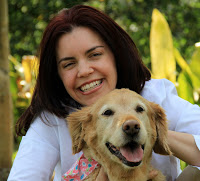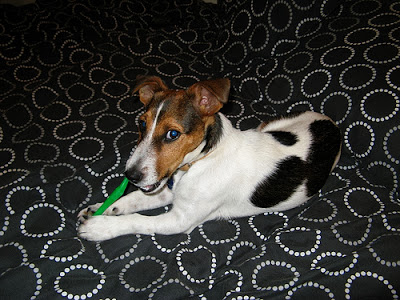Dogs
by Dr. Julie Buzby








Dr. Julie's opinion or advice does not replace an actual exam with a veterinarian.
- Ask The Veterinatian About Coprophagia
by Julie Buzby, DVM courtesy Dayland via Flickr.com Looking GuiltyDear Dr. Buzby, How do we get our pups to stop eating their own, or other dogs, poop? Thanks, Lori, ----------------------------------------------------------------------------------...
- Ask The Vet With Dr. Mark: Safe Dog Chews
by Mark Nunez, DVM © courtesy pattie74_99 via Flickr.com Your Safest Chewing Toy: Kong Dear Dr Nunez, My dog is a chewer. He has always enjoyed rawhides and pigs ears and anything tasty he can naw on for hours. I have been told...
- A Greenie Giveawayjust In Time For Earth Day
by Carrie Boyko, CEB © Carrie Boyko Teenie Greenies for the Green Litte Dog at Your HouseOh, dear....Pet Dental Health Month was was way back in February. Now it's Earth Day and you're trying to Go Green? Time for a Greenies intervention......
- Oral Hygiene And Your Dog
By Ruthie Bently Good oral hygiene is as important for canines as it is for humans. Our dogs can get cavities, crack a tooth, and get plaque buildup on their teeth. They can even get gum disease if their teeth are not taken care of properly. Dogs don’t...
- Stinky Dog Breath
Dogs love to come over and lick their owners and receive plenty of kisses in return. This is their way of showing affection to their dear owner. Bad breath is an ugly put off when it comes to either human interaction or dog affection. This condition...
Dogs
Ask the Vet: Bones as Fido's Dental Care
by Dr. Julie Buzby
 |
| courtesy Photonquantique via Flickr.com A Little Help Please |
Dear Dr. Julie:
Thank you for the wonderful tips. Do you have any thoughts on the use of raw beef marrow bones for dental health. I'd like to hear the pros and cons. Also, which of the products such as Greenies would you recommend?
-------------------------------------------------------------------
Dear All Things Dog Blog readers:
It’s great that you’ve framed the question as an evaluation of pros and cons, because both must be considered. In the pros column, chewing is a rewarding activity for many dogs, and can indeed be beneficial for the teeth and gums. In the cons column, chewed items can cause fractured teeth, pose choke or obstruction hazards, flare up food allergies, and supply unwelcome calories to a dog’s diet.
Bones, particularly with meat still attached, can help clean teeth. That has been my personal observation, and was demonstrated by at least one scientific study. But, overall, I have to give “beef marrow bones” a thumbs down. Even though my patients who chew on bones often have pearly whites, in my opinion, the risks outweigh the benefits.
Bones are notorious for cracking the crowns off the big upper 4th premolar (or carnassial) teeth in dogs. If you lift your dog’s upper lip, you can identify this tooth on each side, because it looks like a miniature upside down mountain range, and is the biggest tooth in the mouth. The only way to address these fractured teeth is with a major dental procedure under anesthesia—generally extraction. Left alone, a fractured crown is an abscess waiting to happen and is very painful.
Bones can also cause esophageal or intestinal obstruction, perforation, and constipation.
Similar to bones are antler chews. I have a personal vendetta against antlers. They seem to be very popular lately as “natural” chew toys, and I bought into the propaganda. My own young dog, with immaculate healthy teeth, cracked the tips off of five of his premolars in a matter of hours gnawing on an antler. They are absolutely just too hard.
One of my colleagues says that chewing on bones and antlers is like playing in traffic. You may get away with it for a while, but eventually something bad will happen.
Water additive: My recommendation for dogs is Healthymouth™. It is recommended and sold by numerous board certified veterinary dentists and has been proven successful in many clinical trials. This anti-plaque product contains no alcohol or xylitol, and has seven seals of approval from the Veterinary Oral Health Council (VOHC).
Greenies: Though don’t stand up very long to tough chewing, Greenies can be a fun treat for dogs and are proven to help reduce plaque and tartar. They have also been awarded the VOHC Seal of Approval. For a pet on a weight loss program, beware that that they do contribute calories.
As a general rule, rubber chew toys are considered safe, but I recommend using all chew toy products under “adult supervision”.
As a final note, it’s important to understand that these items may be helpful for plaque and tartar control, but are not able to treat dental disease. Rather, they are part of a comprehensive oral healthcare program that should include daily teeth brushing and regular professional examinations.
Dr. Julie Buzby is a homeschooling mom of seven, American Veterinary Chiropractic Association and International Veterinary Acupuncture Society certified holistic veterinarian, and passionate advocate for canine mobility.In her free time she serves on the Advisory Board for The Grey Muzzle Organization. She can be found at Twitter @DrBuzby and on Facebook.com/ToeGrips. You'll also find more of Dr. Julie's posts at our Ask the Vet Archives page.
Here are a few of her articles that may be of interest:
- 10 Tips for Fido's Longest Life
- Leaner Pets Live Longer
- Finicky Eaters
- Tweaking Your Dog's Vaccinations
- Insight on Friendship Changes







- Ask The Veterinatian About Coprophagia
by Julie Buzby, DVM courtesy Dayland via Flickr.com Looking GuiltyDear Dr. Buzby, How do we get our pups to stop eating their own, or other dogs, poop? Thanks, Lori, ----------------------------------------------------------------------------------...
- Ask The Vet With Dr. Mark: Safe Dog Chews
by Mark Nunez, DVM © courtesy pattie74_99 via Flickr.com Your Safest Chewing Toy: Kong Dear Dr Nunez, My dog is a chewer. He has always enjoyed rawhides and pigs ears and anything tasty he can naw on for hours. I have been told...
- A Greenie Giveawayjust In Time For Earth Day
by Carrie Boyko, CEB © Carrie Boyko Teenie Greenies for the Green Litte Dog at Your HouseOh, dear....Pet Dental Health Month was was way back in February. Now it's Earth Day and you're trying to Go Green? Time for a Greenies intervention......
- Oral Hygiene And Your Dog
By Ruthie Bently Good oral hygiene is as important for canines as it is for humans. Our dogs can get cavities, crack a tooth, and get plaque buildup on their teeth. They can even get gum disease if their teeth are not taken care of properly. Dogs don’t...
- Stinky Dog Breath
Dogs love to come over and lick their owners and receive plenty of kisses in return. This is their way of showing affection to their dear owner. Bad breath is an ugly put off when it comes to either human interaction or dog affection. This condition...
